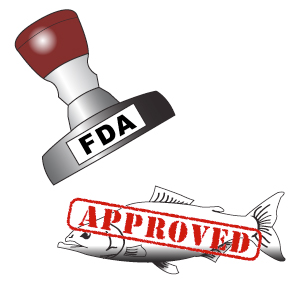
One of the arguments against expanding the FDA’s powers over food safety is that the agency has repeatedly shown an unwillingness to enforce existing laws and to regulate aggressively in the face of corporate lobbying.
Unfortunately, we now have more evidence that the FDA may indeed be a bad-faith regulator.
The Center for Food Safety has unearthed convincing evidence that the FDA is attempting to freeze out marine and fisheries experts from the U.S. Fish and Wildlife Service and National Oceanic and Atmospheric Administration in its rush to approve biotech company AquaBounty’s genetically modified salmon for human consumption.
According to documents obtained by the consumer group via a Freedom of Information Act request, the FDA has held only “preliminary” discussions with these agencies regarding AquaBounty’s product and has not allowed government scientists to review some of the company’s “confidential” data. According to an email sent between staffers at Fish and Wildlife and NOAA, they’ve been kept out of the loop for some time:
Shortly after the Atlantic salmon was listed as endangered, several of us from USFWS and NMFS spent 2 days down in Maryland meeting with AquaBounty and FDA about development of genetically modified salmon and discussion around the need for FDA to engage in Section 7 consultation with the Services. We never heard a peep out of FDA or AquaBounty after that.
It’s ironic that the FDA, an agency so bureaucratically unprepared to regulate GE foods that it considers AquaBounty’s salmon the same way it would a “veterinary drug” has decided that this process has no place for scientists who actually understand fish biology and marine ecosystems.
Specifically, the Center for Food Safety accuses the FDA of having “knowingly withheld a Federal Biological Opinion by the U.S. Fish and Wildlife Service (FWS) and National Oceanic and Atmospheric Administration (NOAA) prohibiting the use of transgenic salmon in open-water net pens pursuant to the U.S. Endangered Species Act.”
While it’s important to note that AquaBounty’s system for growing genetically engineered salmon is land-based — it has no plans to put these fish in ocean-based pens where the threat of escape is high — it seems like a relevant point to observe that U.S. regulations currently forbid GE fish aquaculture in our coastal waters.
Moreover, government scientists have apparently established that GE salmon would out-compete native species for food, may have adaptive advantages in warming waters, and might collect environmental toxins in their flesh at higher rates than native species. This seems like useful information! But all of it was kept from the public and out of the recent FDA hearings on the safety of AquaBounty’s fish.
Given that scientists at these two agencies have spent time looking into the issues surrounding GE salmon, it’s deeply disturbing that the FDA has so explicitly excluded them from the approval process and suppressed their data in order to further a single corporation’s interests. I guess the FDA never got the memo about all that “change we can believe in.”


